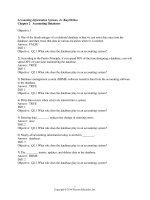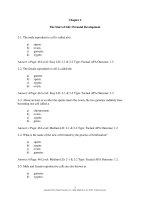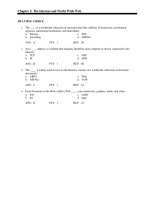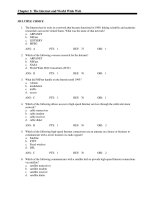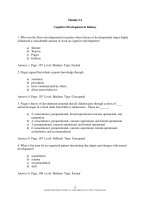Discovering the life span 2nd edition feldman test bank
Bạn đang xem bản rút gọn của tài liệu. Xem và tải ngay bản đầy đủ của tài liệu tại đây (229.89 KB, 84 trang )
Chapter 2
The Start of Life: Prenatal Development
2-1. What is the name of the new cell formed by the process of fertilization?
a)
b)
c)
d)
sperm
zygote
ovum
gametes
Answer: b Page: 43 Level: Medium Type: Factual
Module 2.1: Prenatal Development
Learning Objective: L01
2-2. What is the basic unit of genetic information?
a)
b)
c)
d)
zygote
sperm
gene
gametes
Answer: c Page: 43 Level: Medium Type: Factual
Module 2.1: Prenatal Development
Learning Objective: L01
2-3. The male reproductive cell is called a(n)
a)
b)
c)
d)
sperm.
ovum.
gametes.
zygote.
Answer: a Page: 42 Level: Easy Type: Factual
Module 2.1: Prenatal Development
Learning Objective: L01
2-4. The female reproductive cell is called the
a)
b)
c)
d)
gamete.
sperm.
zygote.
ovum.
Answer: d Page: 42 Level: Easy Type: Factual
Module 2.1: Prenatal Development
Learning Objective: L01
2-5. About an hour or so after the sperm enters the ovum, the two gametes suddenly fuse,
becoming one cell called a
57
Copyright © 2012 by Pearson Education, Inc. All rights reserved.
a)
b)
c)
d)
chromosome.
ovum.
zygote.
genes.
Answer: c Page: 43 Level: Medium Type: Factual
Module 2.1: Prenatal Development
Learning Objective: L01
2-6. The potential for the vast diversity of human beings primarily resides in the nature of the
processes that underlie __________ cell division.
a)
b)
c)
d)
sperm
ovum
chromosome
gamete
Answer: d Page: 43 Level: Difficult Type: Factual
Module 2.1: Prenatal Development
Learning Objective: L01
2-7. Male and female reproductive cells are also known as
a)
b)
c)
d)
gametes.
zygotes.
genes.
chromosomes.
Answer: a Page: 43 Level: Medium Type: Factual
Module 2.1: Prenatal Development
Learning Objective: L01
2-8. The blueprints for creating a person are stored and communicated in our
a)
b)
c)
d)
zygote.
genes.
gametes.
ovum.
Answer: b Pages: 43 Level: Easy Type: Factual
Module 2.1: Prenatal Development
Learning Objective: L01
2-9. Name the substance that genes are composed of that determines the nature of each cell in the
body and how it will function.
a)
b)
c)
chromosomes
gametes
zygotes
58
Copyright © 2012 by Pearson Education, Inc. All rights reserved.
d)
DNA (deoxyribonucleic acid)
Answer: d Page: 43 Level: Easy Type: Factual
Module 2.1: Prenatal Development
Learning Objective: L01
2-10. What is the name of the rod-shaped portions of DNA that are organized in 23 pairs?
a)
b)
c)
d)
genes
gametes
chromosomes
ovum
Answer: c Page: 43 Level: Easy Type: Factual
Module 2.1: Prenatal Development
Learning Objective: L01
2-11. All genes are composed of specific sequences of _______ molecules.
a)
b)
c)
d)
DNA
zygote
ovum
sperm
Answer: a Page: 43 Level: Medium Type: Factual
Module 2.1: Prenatal Development
Learning Objective: L01
2-12. Genes are arranged in specific locations and in a specific order along ____ chromosomes.
a)
b)
c)
d)
52
23
46
54
Answer: c Page: 43 Level: Difficult Type: Factual
Module 2.1: Prenatal Development
Learning Objective: L01
2-13. Rod-shaped chromosomes, portions of DNA, are organized in ____ pairs.
a)
b)
c)
d)
52
23
46
54
Answer: b Page: 43 Level: Difficult Type: Factual
Module 2.1: Prenatal Development
Learning Objective: L01
59
Copyright © 2012 by Pearson Education, Inc. All rights reserved.
2-14. The ____ chromosomes in the new zygote contain the genetic blueprint that will guide cell
activity for the rest of the individual’s life.
a)
b)
c)
d)
52
46
54
32
Answer: b Page: 43 Level: Difficult Type: Factual
Module 2.1: Prenatal Development
Learning Objective: L01
2-15. The process of _______ accounts for the replication of most types of cells, so nearly all the
cells of the body will contain the same 46 chromosomes as the zygote.
a)
b)
c)
d)
meiosis
cell division
mitosis
reproduction
Answer: c Pages: 44 Level: Medium Type: Factual
Module 2.1: Prenatal Development
Learning Objective: L01
2-16. When gametes are formed in the human body, this is called
a)
b)
c)
d)
division.
meiosis.
mitosis.
genetic instruction.
Answer: b Page: 44 Level: Difficult Type: Factual
Module 2.1: Prenatal Development
Learning Objective: L01
2-17. The ultimate outcome of meiosis, in combination with other processes, is tens of _______
of genetic combinations.
a)
b)
c)
d)
billions
millions
thousands
trillions
Answer: d Page: 44 Level: Difficult Type: Factual
Module 2.1: Prenatal Development
Learning Objective: L01
2-18. Twins who are genetically identical are called ________ twins.
a)
gamete
60
Copyright © 2012 by Pearson Education, Inc. All rights reserved.
b)
c)
d)
monozygotic
dizygotic
zygote
Answer: b Page: 44 Level: Medium Type: Factual
Module 2.1: Prenatal Development
Learning Objective: L01
2-19. Jason and Justin are twins and are genetically identical. They are ________ twins.
a)
b)
c)
d)
gamete
dizygotic
monozygotic
zygote
Answer: c Page: 44 Level: Medium Type: Applied
Module 2.1: Prenatal Development
Learning Objective: L01
2-20. Any differences in future development of monozygotic twins can be attributed only to
_________ factors.
a)
b)
c)
d)
genetic
chromosome
environmental
DNA
Answer: c Page: 44 Level: Medium Type: Conceptual
Module 2.1: Prenatal Development
Learning Objective: L01
2-21. Twins who are produced when two separate ova are fertilized by two separate sperm at
roughly the same time are called ________ twins.
a)
b)
c)
d)
dizygotic
monozygotic
gamete
zygote
Answer: a Page: 44 Level: Medium Type: Factual
Module 2.1: Prenatal Development
Learning Objective: L01
2-22. Evan and Evelyn are twins but are not genetically identical. They are ________ twins.
a)
b)
c)
d)
gamete
dizygotic
monozygotic
zygote
61
Copyright © 2012 by Pearson Education, Inc. All rights reserved.
Answer: b Page: 44 Level: Medium Type: Applied
Module 2.1: Prenatal Development
Learning Objective: L01
2-23. ________ twins are no more genetically similar than two siblings born at different times.
a)
b)
c)
d)
Dizygotic
Monozygotic
Gamete
Zygotic
Answer: a Page: 44 Level: Medium Type: Conceptual
Module 2.1: Prenatal Development
Learning Objective: L01
2-24. Which of the following are NOT likely to have multiple births?
a)
b)
c)
d)
older women
women who take fertility drugs
families in which multiple births runs in the family
younger women
Answer: d Page: 44 Level: Medium Type: Conceptual
Module 2.1: Prenatal Development
Learning Objective: L01
2-25. Multiple births have _________ in the last 25 years due to fertility drugs and the rising
average age of mothers giving birth.
a)
b)
c)
d)
decreased
remained the same
increased
varied up and down
Answer: c Page: 44 Level: Medium Type: Factual
Module 2.1: Prenatal Development
Learning Objective: L01
2-26. The 23rd pair of chromosomes in males contains the ___- shaped chromosome.
a)
b)
c)
d)
XX
XY
YX
YY
Answer: b Page: 44 Level: Difficult Type: Factual
Module 2.1: Prenatal Development
Learning Objective: L01
2-27. If the child has an XX pairing on the 23rd chromosome, the child will be
62
Copyright © 2012 by Pearson Education, Inc. All rights reserved.
a)
b)
c)
d)
male.
monozygotic.
dizygotic.
female.
Answer: d Page: 44 Level: Medium Type: Factual
Module 2.1: Prenatal Development
Learning Objective: L01
2-28. The fact that the ______determines the gender of the child is leading to the development of
techniques that will allow parents to increase the chances of choosing the child’s gender.
a)
b)
c)
d)
woman’s ovum
man’s sperm
chromosome type
chromosome similarity
Answer: b Page: 45 Level: Medium Type: Factual
Module 2.1: Prenatal Development
Learning Objective: L01
2-29. The one trait that is expressed when two competing traits are present is called
a)
b)
c)
d)
recessive.
genotype.
dominant.
phenotype.
Answer: c Page: 45 Level: Medium Type: Factual
Module 2.1: Prenatal Development
Learning Objective: L01
2-30. A trait within an organism that is present but not expressed is called
a)
b)
c)
d)
dominant.
genotype.
phenotype.
recessive.
Answer: d Page: 45 Level: Medium Type: Factual
Module 2.1: Prenatal Development
Learning Objective: L01
2-31. An observable trait, the trait that is actually seen, is labeled
a)
b)
c)
d)
dominant.
recessive.
a genotype.
a phenotype.
63
Copyright © 2012 by Pearson Education, Inc. All rights reserved.
Answer: d Page: 45 Level: Medium Type: Factual
Module 2.1: Prenatal Development
Learning Objective: L01
2-32. The underlying combination of genetic material present (but not outwardly visible) in an
organism is called
a)
b)
c)
d)
a genotype.
a phenotype.
dominant.
recessive.
Answer: a Page: 45 Level: Difficult Type: Factual
Module 2.1: Prenatal Development
Learning Objective: L01
2-33. When a child inherits similar genes for a given trait from his/her parents, the child is said to
be ________ for that trait.
a)
b)
c)
d)
genotype
homozygous
phenotype
heterozygous
Answer: b Page: 45 Level: Difficult Type: Factual
Module 2.1: Prenatal Development
Learning Objective: L01
2-34. Eric has blue eyes. Since the gene for blue eyes is recessive, Eric must be ______ for that
trait.
a)
b)
c)
d)
genotype
homozygous
phenotype
heterozygous
Answer: b Page: 45 Level: Difficult Type: Applied
Module 2.1: Prenatal Development
Learning Objective: L01
2-35. When a child receives different forms of a certain gene from his/her parents, he or she is
said to be
a)
b)
c)
d)
dominant.
phenotype.
homozygous.
heterozygous.
Answer: d Page: 45 Level: Difficult Type: Factual
Module 2.1: Prenatal Development
Learning Objective: L01
64
Copyright © 2012 by Pearson Education, Inc. All rights reserved.
2-36. What is the name of the inherited disorder in which a child is unable to make use of an
essential amino acid present in proteins found in milk and other foods and that has the potential
to cause brain damage and mental retardation?
a)
b)
c)
d)
heterozygous
phenylketonuria (PKU)
homozygous
chromosome deficiency
Answer: b Page: 46 Level: Medium Type: Factual
Module 2.1: Prenatal Development
Learning Objective: L02
2-37. In ________ inheritance, a combination of multiple gene pairs is responsible for the
production of a particular trait.
a)
b)
c)
d)
X-lined
PKU
polygenic
heterozygous
Answer: c Page: 46 Level: Difficult Type: Factual
Module 2.1: Prenatal Development
Learning Objective: L02
2-38. What type of gene is considered recessive and located only on the X chromosome?
a)
b)
c)
d)
heterozygous
X-linked
homozygous
dominant
Answer: b Page: 46 Level: Medium Type: Conceptual
Module 2.1: Prenatal Development
Learning Objective: L02
2-39. What is the term applied to studying the effects of heredity on psychological characteristics
and behavior?
a)
b)
c)
d)
gene sequence
mapping
behavioral genetics
human genome
Answer: c Page: 47 Level: Medium Type: Factual
Module 2.1: Prenatal Development
Learning Objective: L02
2-40. What is the term for the inherited blood-clotting disorder that has been a problem
throughout the royal families of Europe, such as the descendants of Queen Victoria?
65
Copyright © 2012 by Pearson Education, Inc. All rights reserved.
a)
b)
c)
d)
X-linked
PKU disease
polygenic inheritance
hemophilia
Answer: d Page: 46 Level: Medium Type: Factual
Module 2.1: Prenatal Development
Learning Objective: L02
2-41. Humans have about ______ genes.
a)
b)
c)
d)
50,000
25,000
100,000
10,000
Answer: b Page: 47 Level: Difficult Type: Factual
Module 2.1: Prenatal Development
Learning Objective: L02
2-42. Sometimes genes, for no known reason, change their form in a process called
a)
b)
c)
d)
spontaneous acceleration.
spontaneous combustion.
spontaneous mutation.
spontaneous malformation.
Answer: c Page: 47 Level: Medium Type: Factual
Module 2.1: Prenatal Development
Learning Objective: L02
2-43. Jose has an extra chromosome on the twenty-first pair of chromosomes. The disorder was
once referred to as mongolism. This will cause him to have
a)
b)
c)
d)
hemophilia.
fragile X syndrome.
sickle-cell anemia.
Down syndrome.
Answer: d Page: 48 Level: Medium Type: Applied
Module 2.1: Prenatal Development
Learning Objective: L02
2-44. Jamal has an extra chromosome on the twenty-first pair of chromosomes, causing him to
have
a)
b)
c)
hemophilia.
fragile X syndrome.
Down syndrome.
66
Copyright © 2012 by Pearson Education, Inc. All rights reserved.
d)
sickle-cell anemia.
Answer: c Page: 48 Level: Medium Type: Applied
Module 2.1: Prenatal Development
Learning Objective: L02
2-45. Sue has a disorder that is produced by an injury to a gene on the X chromosome, producing
mild to moderate mental retardation. She has
a)
b)
c)
d)
Down syndrome.
Tay-Sachs disease.
Fragile X syndrome.
Klinefelter’s syndrome.
Answer: c Page: 48 Level: Medium Type: Applied
Module 2.1: Prenatal Development
Learning Objective: L02
2-46. Toni has a blood disorder that gets its name from the shape of the red blood cells. She
would be diagnosed with what disorder?
a)
b)
c)
d)
sickle-cell anemia
hemophilia
Klinefelter’s syndrome
fragile X syndrome
Answer: a Page: 48 Level: Medium Type: Applied
Module 2.1: Prenatal Development
Learning Objective: L02
2-47. Tera has a disorder that is untreatable and produces blindness and muscle degeneration
prior to death. Her diagnosis would be
a)
b)
c)
d)
Fragile X syndrome.
Tay-Sachs disease.
Klinefelter’s syndrome.
hemophilia.
Answer: b Page: 48 Level: Medium Type: Applied
Module 2.1: Prenatal Development
Learning Objective: L02
2-48. Akili has the disorder that results from the presence of an extra X chromosome that
produces underdeveloped genitals, extreme height, and enlarged breasts. She has
a)
b)
c)
d)
Klinefelter’s syndrome.
Down syndrome.
Tay-Sachs disease.
fragile X syndrome.
67
Copyright © 2012 by Pearson Education, Inc. All rights reserved.
Answer: a Page: 48 Level: Medium Type: Applied
Module 2.1: Prenatal Development
Learning Objective: L02
2-49. Scientists have discovered that carrying the sickle-cell gene raises immunity to _______,
which is a common disease in West Africa.
a)
b)
c)
d)
hemophilia
blood pressure
malaria
anemia
Answer: c Pages: 48 Level: Easy Type: Factual
Module 2.1: Prenatal Development
Learning Objective: L02
2-50. What is the profession that focuses on helping people deal with issues relating to inherited
disorders?
a)
b)
c)
d)
psychological counseling
disorders counseling
genetic counseling
family counseling
Answer: c Page: 48 Level: Medium Type: Conceptual
Module 2.1: Prenatal Development
Learning Objective: L03
2-51. What is the process in which high-frequency sound waves scan the mother’s womb to
produce an image of the unborn baby, whose size and shape can then be assessed?
a)
b)
c)
d)
first-trimester screen
ultrasound sonography
amniocentesis
chorionic villus sampling (CVS)
Answer: b Page: 49 Level: Medium Type: Factual
Module 2.1: Prenatal Development
Learning Objective: L03
2-52. What is used to find genetic defects and involves taking samples of the hair-like material
that surrounds the embryo?
a)
b)
c)
d)
karyotype
amniocentesis
ultrasound sonography
chorionic villus sampling (CVS)
Answer: d Page: 49 Level: Medium Type: Factual
Module 2.1: Prenatal Development
Learning Objective: L03
68
Copyright © 2012 by Pearson Education, Inc. All rights reserved.
2-53. What is the name of the earliest prenatal test that occurs in the 11th to 13th week of
pregnancy and can identify chromosomal abnormalities and other disorders, such as heart
problems?
a)
b)
c)
d)
amniocentesis
chorionic villus sampling (CVS)
ultrasound sonography
first-trimester screen
Answer: d Page: 49 Level: Medium Type: Conceptual
Module 2.1: Prenatal Development
Learning Objective: L03
2-54. What is the more invasive prenatal test that can be employed if blood tests and ultrasound
have identified a potential problem or if there is a family history of inherited disorders?
a)
b)
c)
d)
amniocentesis
chorionic villus sampling (CVS)
ultrasound sonography
first-trimester screen
Answer: b Page: 49 Level: Difficult Type: Conceptual
Module 2.1: Prenatal Development
Learning Objective: L03
2-55. Which infrequently used test is usually performed between the 8th and 11th week of
pregnancy but produces a risk of miscarriage of 1 in 100 to 1 in 200 pregnancies?
a)
b)
c)
d)
amniocentesis
ultrasound sonography
chorionic villus sampling (CVS)
first-trimester screen
Answer: c Page: 49 Level: Difficult Type: Conceptual
Module 2.1: Prenatal Development
Learning Objective: L03
2-56. Which test is most often performed at 8 to 11 weeks, and involves inserting a needle
(abdominally) or a catheter (cervically) into the substance of the placenta (but staying outside the
amniotic sac) and removing 10 to 15 milligrams of tissue, which is cleaned of maternal uterine
tissue, and then grown in a culture so that a karyotype can be made?
a)
b)
c)
d)
amniocentesis
chorionic villus sampling (CVS)
sonoembryology
embryoscopy
Answer: b Pages: 49 Level: Difficult Type: Conceptual
69
Copyright © 2012 by Pearson Education, Inc. All rights reserved.
Module 2.1: Prenatal Development
Learning Objective: L03
2-57. Huela is going to have her first child and talks to her physician about assessing the health
of her unborn child. The physician recommends a test which combines a blood test and
ultrasound sonography. Which procedure was recommended?
a)
b)
c)
d)
amniocentesis
sonogram
first-trimester screen
embryoscopy
Answer: c Page: 49 Level: Difficult Type: Applied
Module 2.1: Prenatal Development
Learning Objective: L03
2-58. Name the process of identifying genetic defects by examining a small sample of fetal cells
that are drawn by a needle inserted into the amniotic fluid surrounding the unborn fetus.
a)
b)
c)
d)
amniocentesis
karyotype
ultrasound sonography
chorionic villus sampling (CVS)
Answer: a Page: 49 Level: Medium Type: Conceptual
Module 2.1: Prenatal Development
Learning Objective: L03
2-59. Amniocentesis is carried out _____ weeks into the pregnancy.
a)
b)
c)
d)
5 – 10
10 – 15
15 – 20
20 – 25
Answer: c Page: 49 Level: Difficult Type: Factual
Module 2.1: Prenatal Development
Learning Objective: L03
2-60. Which test is carried out 15 to 20 weeks into the pregnancy and allows the analysis of fetal
cells that can identify a variety of genetic defects with nearly 100% accuracy?
a)
b)
c)
d)
chorionic villus sampling (CVS)
ultrasound sonography
first-trimester screen
amniocentesis
Answer: d Page: 49 Level: Difficult Type: Conceptual
Module 2.1: Prenatal Development
Learning Objective: L03
70
Copyright © 2012 by Pearson Education, Inc. All rights reserved.
2-61. Which test can be used to determine the sex of the child?
a)
b)
c)
d)
ultrasound sonography
amniocentesis
chorionic villus sampling (CVS)
first-trimester screen
Answer: b Page: 49 Level: Medium Type: Conceptual
Module 2.1: Prenatal Development
Learning Objective: L03
2-62. Which test examines the embryo or fetus during the first 12 weeks of pregnancy by means
of a fiber-optic device inserted through the cervix?
a)
b)
c)
d)
embryoscopy
amniocentesis
sonoembryology
chorionic villus sampling (CVS)
Answer: a Page: 49 Level: Difficult Type: Conceptual
Module 2.1: Prenatal Development
Learning Objective: L03
2-63. Which test is performed as early as week 5 and allows access to the fetal circulation and
direct visualization of the embryo, permitting the diagnosis of malformations?
a)
b)
c)
d)
amniocentesis
embryoscopy
chorionic villus sampling (CVS)
sonoembryology
Answer: b Page: 49 Level: Difficult Type: Conceptual
Module 2.1: Prenatal Development
Learning Objective: L03
2-64. Which test procedure is recommended if either parent carries Tay-Sachs, spina bifida,
sickle-cell, Down syndrome, muscular dystrophy, or Rh disease?
a)
b)
c)
d)
amniocentesis
embryoscopy
chorionic villus sampling (CVS)
sonoembryology
Answer: a Page: 49 Level: Difficult Type: Conceptual
Module 2.1: Prenatal Development
Learning Objective: L03
2-65. Which test is performed after 18 weeks of pregnancy by collecting a small amount of blood
from the umbilical cord for testing?
71
Copyright © 2012 by Pearson Education, Inc. All rights reserved.
a)
b)
c)
d)
embryoscopy
amniocentesis
fetal blood sampling (FBS)
chorionic villus sampling (CVS)
Answer: c Page: 49 Level: Difficult Type: Conceptual
Module 2.1: Prenatal Development
Learning Objective: L03
2-66. Which test is used to detect Down syndrome by collecting blood from the umbilical cord
after the 18th week of pregnancy?
a)
b)
c)
d)
fetal blood sampling (FBS)
embryoscopy
chorionic villus sampling (CVS)
amniocentesis
Answer: a Page: 53 Level: Difficult Type: Conceptual
Module 2.1: Prenatal Development
Learning Objective: L03
2-67. What procedure is used to detect abnormalities in the first trimester of pregnancy, and
involves high-frequency transvaginal probes and digital visual processing?
a)
b)
c)
d)
fetal blood sampling (FBS)
sonoembryology
embryoscopy
first-trimester screen
Answer: b Page: 49 Level: Difficult Type: Conceptual
Module 2.1: Prenatal Development
Learning Objective: L03
2-68. Which procedure, in combination with ultrasound, can detect more than 80% of all
malformations during the second trimester?
a)
b)
c)
d)
sonoembryology
fetal blood sampling (FBS)
embryoscopy
amniocentesis
Answer: a Page: 49 Level: Difficult Type: Conceptual
Module 2.1: Prenatal Development
Learning Objective: L03
2-69. Which procedure produces a visual image of the uterus, fetus, and placenta?
a)
b)
c)
sonoembryology
sonogram
chorionic villus sampling (CVS)
72
Copyright © 2012 by Pearson Education, Inc. All rights reserved.
d)
embryoscopy
Answer: b Page: 49 Level: Difficult Type: Conceptual
Module 2.1: Prenatal Development
Learning Objective: L03
2-70. Which procedure uses very high frequency sound waves to detect structural abnormalities
or multiple pregnancies, measure fetal growth, judge gestational age, and evaluate uterine
abnormalities?
a)
b)
c)
d)
ultrasound sonography
sonoembryology
embryoscopy
sonogram
Answer: a Page: 49 Level: Difficult Type: Conceptual
Module 2.1: Prenatal Development
Learning Objective: L03
2-71. Which testing procedure uses high frequency sound waves and is used as an adjunct to
other procedures, such as amniocentesis?
a)
b)
c)
d)
sonogram
sonoembryology
ultrasound sonography
embryoscopy
Answer: c Page: 49 Level: Difficult Type: Conceptual
Module 2.1: Prenatal Development
Learning Objective: L03
2-72. Huntington’s disease typically does not appear until people reach what age?
a)
b)
c)
d)
20s
40s
50s
70s
Answer: b Page: 50 Level: Medium Type: Factual
Module 2.1: Prenatal Development
Learning Objective: L03
2-73. What is the procedure where cells are taken from an embryo and then replaced after the
defective genes they contain have been repaired?
a)
b)
c)
d)
germ line therapy
genetic counseling
preimplantation genetic diagnosis (PGD)
fetal blood sampling
73
Copyright © 2012 by Pearson Education, Inc. All rights reserved.
Answer: a Page: 50 Level: Difficult Type: Conceptual
Module 2.1: Prenatal Development
Learning Objective: L03
2-74. Patterns of arousal and emotionality that represent consistent and enduring characteristics
in an individual are called
a)
b)
c)
d)
genetics.
genotype.
temperament.
phenotype.
Answer: c Page: 51 Level: Easy Type: Factual
Module 2.1: Prenatal Development
Learning Objective: L04
2-75. What is the term for the determination of traits by a combination of both genetic and
environmental factors, in which a genotype provides a range within which a phenotype may be
expressed?
a)
b)
c)
d)
multifactorial transmission
inheritance
natural selection
role of environment
Answer: a Page: 51 Level: Medium Type: Conceptual
Module 2.1: Prenatal Development
Learning Objective: L04
2-76. Nature has provided the potential to carry out various kinds of “natural experiments” in the
form of
a)
b)
c)
d)
genotypes.
twins.
phenotypes.
genetics.
Answer: b Page: 52 Level: Easy Type: Factual
Module 2.1: Prenatal Development
Learning Objective: L05
2-77. The closer the genetic link between two individuals, the greater the correspondence
between their
a)
b)
c)
d)
weight.
blood pressure.
IQ scores.
respiration rate.
Answer: c Page: 54 Level: Medium Type: Factual
74
Copyright © 2012 by Pearson Education, Inc. All rights reserved.
Module 2.1: Prenatal Development
Learning Objective: L05
2-78. Which researcher argued that as much as 80% of intelligence is a result of heredity?
a)
b)
c)
d)
Freud
Erikson
Scarr
Jensen
Answer: d Page: 54 Level: Medium Type: Factual
Module 2.1: Prenatal Development
Learning Objective: L05
2-79. Which “Big Five” personality trait refers to the degree of emotional stability an individual
characteristically displays?
a)
b)
c)
d)
aggression
neuroticism
shyness
fear
Answer: b Page: 55 Level: Medium Type: Factual
Module 2.1: Prenatal Development
Learning Objective: L05
2-80. Which “Big Five” personality trait refers to the degree to which a person seeks to be with
others, to behave in an outgoing manner, and generally to be sociable?
a)
b)
c)
d)
neuroticism
gregariousness
social potency
extroversion
Answer: d Page: 55 Level: Medium Type: Factual
Module 2.1: Prenatal Development
Learning Objective: L05
2-81. Parents in the United States are more likely to encourage higher _______ levels, while
Asian parents are more likely to encourage greater
a)
b)
c)
d)
passivity; activity.
neuroticism; social potency.
activity; passivity.
social potency; neuroticism.
Answer: c Page: 56 Level: Medium Type: Factual
Module 2.1: Prenatal Development
Learning Objective: L05
75
Copyright © 2012 by Pearson Education, Inc. All rights reserved.
2-82. What trait reflects the tendency to be a masterful, forceful leader who enjoys being the
center of attention, and has been found to be strongly associated with genetic factors?
a)
b)
c)
d)
neuroticism
social potency
extroversion
traditionalism
Answer: b Page: 56 Level: Medium Type: Conceptual
Module 2.1: Prenatal Development
Learning Objective: L05
2-83. What trait reflects the tendency to strictly endorse rules and authority, and has been found
to be strongly associated with genetic factors?
a)
b)
c)
d)
traditionalism
neuroticism
social potency
extroversion
Answer: a Page: 56 Level: Medium Type: Conceptual
Module 2.1: Prenatal Development
Learning Objective: L05
2-84. The developmental psychologist ________ speculated that the underlying temperament of
a given society, determined genetically, may predispose people in that society toward a particular
philosophy.
a)
b)
c)
d)
Erikson
Watson
Freud
Kagan
Answer: d Page: 55 Level: Medium Type: Factual
Module 2.1: Prenatal Development
Learning Objective: L05
2-85. According to the text, increasing research evidence suggests that _________ is/are brought
about by genetic factors.
a)
b)
c)
d)
temperament
schizophrenia
twins
abnormalities
Answer: b Page: 57 Level: Medium Type: Factual
Module 2.1: Prenatal Development
Learning Objective: L05
76
Copyright © 2012 by Pearson Education, Inc. All rights reserved.
2-86. Research indicates that a monozygotic twin has almost a ____ risk of developing
schizophrenia when the other twin develops the disorder.
a)
b)
c)
d)
10%
25%
50%
100%
Answer: c Page: 57 Level: Difficult Type: Factual
Module 2.1: Prenatal Development
Learning Objective: L05
2-87. Along with schizophrenia, all of the psychological disorders below have been shown to be
related, at least in part, to genetic factors. Which of the following disorders is least likely to have
a genetic factor, according to the text?
a)
b)
c)
d)
depression
autism
attention-deficit/hyperactivity disorder
anxiety
Answer: d Page: 57 Level: Medium Type: Factual
Module 2.1: Prenatal Development
Learning Objective: L05
2-88. Which developmental psychologist endorses the idea that genetic endowment provided to
children by their parents not only determines their genetic characteristics, but also actively
influences their environment?
a)
b)
c)
d)
Erikson
Scarr
Kagan
Skinner
Answer: b Page: 57 Level: Difficult Type: Factual
Module 2.1: Prenatal Development
Learning Objective: L05
2-89. What is the process by which a sperm and an ovum join to form a single new cell?
a)
b)
c)
d)
fertilization
sex
germinal stage
prenatal period
Answer: a Page: 59 Level: Medium Type: Factual
Module 2.2: Prenatal Growth and Change
Learning Objective: L06
2-91. Females are born with around _______ ova located in the two ovaries.
77
Copyright © 2012 by Pearson Education, Inc. All rights reserved.
a)
b)
c)
d)
500,000
100,000
1,000,000
400,000
Answer: d Page: 59 Level: Difficult Type: Factual
Module 2.2: Prenatal Growth and Change
Learning Objective: L06
2-92. From puberty until menopause, a female will ovulate about every ____ days.
a)
b)
c)
d)
15
28
30
31
Answer: b Page: 59 Level: Easy Type: Factual
Module 2.2: Prenatal Growth and Change
Learning Objective: L06
2-93. An adult male typically produces several _____ sperm a day.
a)
b)
c)
d)
thousand
hundred thousand
million
hundred million
Answer: d Page: 60 Level: Difficult Type: Factual
Module 2.2: Prenatal Growth and Change
Learning Objective: L06
2-94. Three days after fertilization, the organism consists of some ___ cells, and by the next day
the number doubles.
a)
b)
c)
d)
32
64
100
150
Answer: a Page: 60 Level: Difficult Type: Factual
Module 2.2: Prenatal Growth and Change
Learning Objective: L06
2-95. The first, and the shortest, stage of the prenatal period is called the ______ stage.
a)
b)
c)
d)
fertilization
germinal
conception
embryonic
78
Copyright © 2012 by Pearson Education, Inc. All rights reserved.
Answer: b Page: 60 Level: Medium Type: Factual
Module 2.2: Prenatal Growth and Change
Learning Objective: L06
2-96. During the germinal stage, the fertilized egg is now called a(n) ___________, and travels
toward the uterus, where it becomes implanted in the uterus’s wall.
a)
b)
c)
d)
ovum
sperm
zygote
blastocyst
Answer: d Page: 60 Level: Medium Type: Factual
Module 2.2: Prenatal Growth and Change
Learning Objective: L06
2-97. A conduit between the mother and fetus, this organ provides nourishment and oxygen via
the umbilical cord.
a)
b)
c)
d)
amniotic sac
ectoderm
placenta
endoderm
Answer: c Page: 60 Level: Medium Type: Factual
Module 2.2: Prenatal Growth and Change
Learning Objective: L06
2-98. What is the name of the period from 2 to 8 weeks following fertilization during which
significant growth occurs in the major organs and body systems?
a)
b)
c)
d)
embryonic stage
fetal stage
fetus stage
fertilization stage
Answer: a Page: 60 Level: Medium Type: Conceptual
Module 2.2: Prenatal Growth and Change
Learning Objective: L06
2-99. In the embryonic stage, what is the term for the outer layer that will form skin, hair, teeth,
sense organs, the brain, and the spinal cord?
a)
b)
c)
d)
ectoderm
placenta
endoderm
mesoderm
Answer: a Page: 60 Level: Medium Type: Factual
79
Copyright © 2012 by Pearson Education, Inc. All rights reserved.
Module 2.2: Prenatal Growth and Change
Learning Objective: L06
2-100. In the embryonic stage, what is the term for the inner layer that produces the digestive
system, liver, pancreas, and respiratory system?
a)
b)
c)
d)
ectoderm
placenta
endoderm
mesoderm
Answer: c Page: 60 Level: Medium Type: Factual
Module 2.2: Prenatal Growth and Change
Learning Objective: L06
2-101. In the embryonic stage, what is the term for the layer that forms the muscles, bones,
blood, and circulatory system?
a)
b)
c)
d)
mesoderm
ectoderm
endoderm
placenta
Answer: a Page: 60 Level: Medium Type: Factual
Module 2.2: Prenatal Growth and Change
Learning Objective: L06
2-102. In the embryonic stage, every part of the body is formed from ____ distinct layers.
a)
b)
c)
d)
3
5
8
10
Answer: a Page: 60 Level: Medium Type: Factual
Module 2.2: Prenatal Growth and Change
Learning Objective: L06
2-103. What is the stage that begins at about 8 weeks after conception and continues until birth?
a)
b)
c)
d)
fertilization stage
fetus stage
embryonic stage
fetal stage
Answer: d Page: 60 Level: Medium Type: Conceptual
Module 2.2: Prenatal Growth and Change
Learning Objective: L06
2-104. What is the term for a developing child from 8 weeks after conception until birth?
80
Copyright © 2012 by Pearson Education, Inc. All rights reserved.
a)
b)
c)
d)
embryo
baby
fetus
zygote
Answer: c Page: 60 Level: Medium Type: Factual
Module 2.2: Prenatal Growth and Change
Learning Objective: L06
2-105. One of the highlights of the _______ stage is the development of the major organs and
basic anatomy.
a)
b)
c)
d)
placenta
germinal
embryonic
fetal
Answer: c Page: 60 Level: Medium Type: Factual
Module 2.2: Prenatal Growth and Change
Learning Objective: L06
2-106. An 8-week-old embryo is only ___ inch(es) long with what appears to be gills and a taillike structure, as well as rudimentary eyes, nose, lips, teeth, and stubby bulges that will form into
arms and legs.
a)
b)
c)
d)
1
2
5
10
Answer: a Page: 60 Level: Medium Type: Factual
Module 2.2: Prenatal Growth and Change
Learning Objective: L06
2-107. In the embryonic stage, the brain begins to undergo rapid development, which causes the
head to represent about ____ of the total length of the embryo.
a)
b)
c)
d)
10%
25%
50%
75%
Answer: c Page: 60 Level: Difficult Type: Factual
Module 2.2: Prenatal Growth and Change
Learning Objective: L06
2-108. In the embryonic stage, the nervous system begins to function around the ___ week, and
weak brain waves begin to be produced.
a)
2nd
81
Copyright © 2012 by Pearson Education, Inc. All rights reserved.
